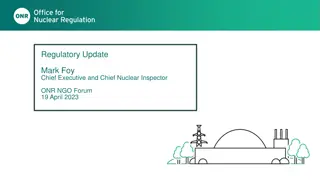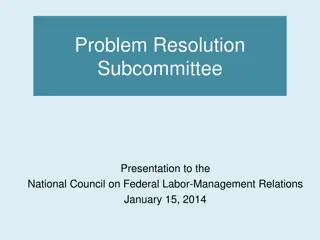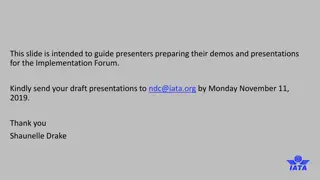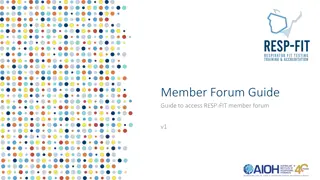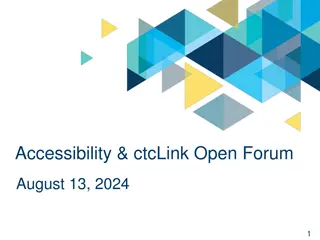
Revolutionizing Skills Training Landscape in England
Enhance your understanding of the significant advancements in skills training in England, from the establishment of IfATE to the future transition to Skills England. Discover the impact on apprenticeships, T Levels, and Higher Technical Qualifications, as well as the key figures leading the way. Stay informed about the strategic direction and collaboration efforts shaping the skills ecosystem.
Download Presentation

Please find below an Image/Link to download the presentation.
The content on the website is provided AS IS for your information and personal use only. It may not be sold, licensed, or shared on other websites without obtaining consent from the author. If you encounter any issues during the download, it is possible that the publisher has removed the file from their server.
You are allowed to download the files provided on this website for personal or commercial use, subject to the condition that they are used lawfully. All files are the property of their respective owners.
The content on the website is provided AS IS for your information and personal use only. It may not be sold, licensed, or shared on other websites without obtaining consent from the author.
E N D
Presentation Transcript
AO Forum 30 April IfATE/Skills England
Quality skills training already in place IfATE has since 2017 driven up the quality of apprenticeships and launched T Levels and Higher Technical Qualifications (HTQs) which all match up to employers rigorous standards. We have pulled everything together into occupational maps, which explain how all the different qualifications support career progression. We will continue to support employers to shape skills training until legislation is passed in Parliament to establish Skills England later in 2025. T Levels successfully launched in 2020 21 now available Digital Higher Technical Qualifications live from 2022 Over 250 approved Level 2 and 3 reformed qualifications Approx 160 Over 660 apprenticeships now available IfATE acting Chief Executive Carmel Grant
Transfer to Skills England Skills England, with its wider remit, will build from IfATE s achievements by: identifying and filling skills gaps; focusing in on the Industrial Strategy priority sectors; supporting delivery that works for local areas; and improving how we give younger people the skills they need to succeed.
Who will run Skills England? Former Cisco UK and Ireland Chair and CEO, Phil Smith, has been appointed as Chair. He brings extensive industry experience in digital, tech and innovation leadership, is also Co-Chair of the government s Digital Skills Council, and was a former Chair of Innovate UK. Sunderland University Chief Executive and Vice Chancellor, Sir David Bell, has been appointed as Vice Chair. He previously served in central government as Permanent Secretary at the DfE and Chief Inspector of Schools in England.
Who will run Skills England? Tessa Griffiths and Sarah Maclean, experienced civil servants who have overseen the setting up of Shadow Skills England, have been appointed as jobshare CEO. Gemma Marsh, who has experience with the No10 Delivery Unit and as Director of Education, Skills and Work with the Greater Manchester Combined Authority, is Deputy CEO.
How will it work? Assessment is data led, with insights also gathered from employers, other government departments, regional & local partners, education/ training providers, unions, the Migration Advisory Committee, and other experts. Department for Education sets the vision and strategy for meeting skills needs, in line with the Industrial Strategy. Skills England has a seamless feedback loop to the Department for Education. Skills England feeds back to DfE on skills challenges and progress addressing them. Skills England provides authoritative assessment of skills need. SKILLS ENGLAND Working with Mayoral Combined Authorities, Employer Representative Bodies, and other regional organisations to align national and regional systems with each other and with skills needs. This includes advising on training eligible for the Growth and Skills Levy and occupational standards. Skills England identifies priorities for and shapes technical education to respond to skills needs. Skills England ensures national and regional systems are meeting skills needs.
Maths and English The government is giving employers more flexibility over maths and English requirements for apprentices. Businesses will now be able to decide whether adult learners, over the age of 19 will need to complete a level 2 English and maths qualification (equivalent to GCSE) to pass it. This means more learners can qualify in high demand sectors such as healthcare, social care, and construction. This policy change is effective immediately and will apply to new starts and existing learners currently on programme.
Shorter apprenticeships Apprenticeships must currently last a minimum 12 months - but we recognise there are circumstances where a learner can achieve occupational competence more quickly. To support this, the government will be reducing the minimum duration to 8 months. This will allow training to be delivered and completed faster where that makes sense eg because that s how that industry works, or an individual has significant prior learning.
End Point Assessment Reforms Introduce a new approach that prioritises securing the aspects of apprenticeship assessment that employers most value, while affording EPAOs the flexibility to design assessments that are valid, reliable and efficient. The new approach will capitalise on the benefits achieved whilst maintaining quality. This will have a positive impact on numerous parts of the system, including: Greater clarity for those implementing the rules Appropriate scope for EPAO flexibility and innovation Streamlined and more efficient apprenticeship assessment development Coverage across all apprenticeships Making the best use of expertise across all stakeholders
EPA reform Assessment principles Allow on- programme assessmentwhere appropriate No unnecessary duplication Proportionate Allow centre- assessmentwhere appropriate Short plans with minimal prescription Employer-verified behaviours Minimum number of assessment methods Assessment at the right time, in the right place Make best use of technology



